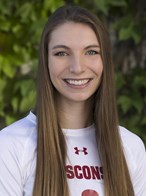
Feisty setters function as the engine that makes a volleyball team go
As a setter, Lexi Zimmerman watches counterparts at her position with a critical eye.
Many times, what Zimmerman sees looks very familiar. Even in warm-ups.
“In something as silly as pepper, you can see that setters are usually the ones on their team who are super feisty and super aggressive. They do everything to not let a ball hit the court,” Zimmerman said. “It’s kind of weird or odd, but I see that all the time.”
That competitiveness doesn’t just manifest itself on the volleyball court. For Zimmerman and other setters, it seems, the desire for success carries over to many other things.
It should come as no surprise then that eight of this year’s candidates for the Lowe’s Senior CLASS Award come from NCAA Division I volleyball’s setter ranks. The award honors the senior who best exemplifies the definition of a complete student-athlete. Attributes measured include community involvement, classroom achievement, personal character and contributions to the success of her team.
A first-team All-American at Michigan, Zimmerman said accountability is another benchmark of setters that you could add to the list. UC Santa Barbara’s Dana Vargas agreed.
“I knew that for my teammates to get better, I needed to improve so much more first,” Vargas said, describing her own development as a player at the collegiate level.
“Setters usually take on more of a leadership role. That’s what I am on the court, and off the court, as well,” she added. “I also like being the quarterback of the team.”
Vargas’ instincts come naturally. Her mother, current UCSB assistant Debbie Green, is considered one of the greatest setters in the history of the college game. Dana’s sister, Nicole, was a setter at Long Beach State.
Zimmerman’s sister, Victoria, played at Indiana and Utah State. And while their older siblings provided Vargas and Zimmerman with a glimpse into the college game, a learning curve remained – both on and off the court.
“One thing that I’ve learned in college is life is a lot about balance,” Zimmerman said. “It’s very easy to get caught up in volleyball, but I’ve always focused on school a lot.”
Zimmerman is pursuing a degree in environmental studies with an emphasis on architecture. She says sustainability and green building are among the few things where her enthusiasm matches that of volleyball. She is also excited to meet her “little sister” this month, part of her volunteer efforts with the Big Brothers Big Sisters program. Zimmerman is also active in Habitat for Humanity building projects.
Vargas volunteers at an animal shelter and has helped to coach a youth volleyball team. The sociology major is considering attending law school after graduation. To this point, Vargas said she’s pursued subjects that were broad in nature, not wanting to limit her options. Not surprisingly, that’s another trademark that Zimmerman has identified in her fellow setters. In addition to Zimmerman and Vargas, other setters who are candidates for the Senior CLASS Award include Sydney Anderson, Nebraska; Jenna Hagglund, Washington; Carli Lloyd, California; Jamie Mellies, Seattle; Jade Michaelsen, New Mexico, and Mary Ashley Tippins, Georgia Tech.
“As a setter, you can’t be a specialist,” Vargas said. “You have to be a generalist.”
And relationships are key, not only unique connections with every teammate but working relationships with coaches. Setters must adapt aggressively to change, as Zimmerman did years ago when a youth coach tried to move her to another position. Vargas shared a similar story. It’s no wonder then that setters are a bit feisty.
“There’s a lot that you have to react to,” Zimmerman said. “In my opinion, that’s why it’s the hardest position.”



